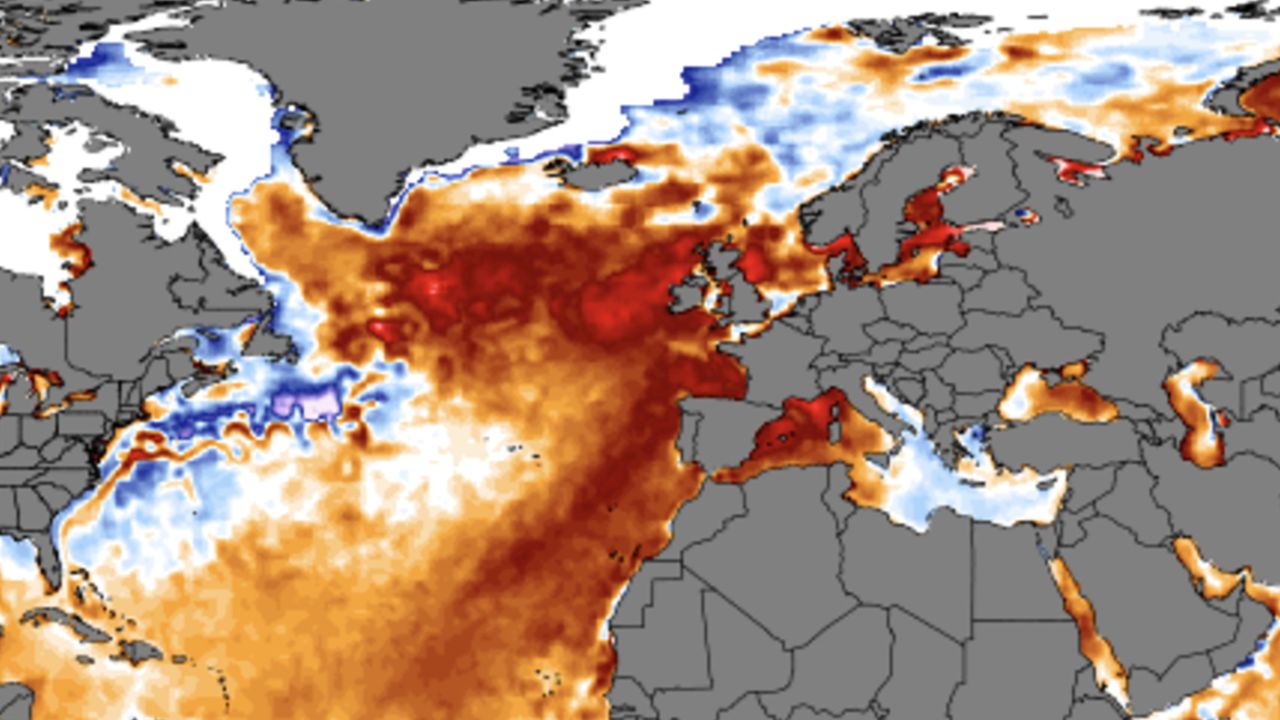begin quote from:
https://www.cnn.com/2023/06/20/europe/marine-heatwave-north-atlantic-climate-scn-intl/index.html
The North Atlantic is experiencing a ‘totally unprecedented’ marine heat wave

Temperatures in parts of the North Atlantic Ocean are soaring off the charts, with an “exceptional” marine heat wave happening off the coasts of the United Kingdom and Ireland, sparking concerns about impacts on marine life.
Parts of the North Sea are experiencing a category 4 marine heat wave – defined as “extreme” – according to the National Oceanic and Atmospheric Administration. In some areas, water temperatures are up to 5 degrees Celsius (9 Fahrenheit) hotter than usual.
Global oceans have been exceptionally warm for months. April and May saw the highest ocean surface temperatures for those two months since records began in 1850.
The regional picture is even more stark, according to the UK Met Office: Temperatures in the North Atlantic in May were around 1.25 degrees Celsius (2.25 Fahrenheit) above average.
“The eastern Atlantic, from Iceland down to the tropics, is much warmer than average. But areas around parts of north-western Europe, including parts of the UK, have among some of the highest sea-surface temperatures relative to average,” Stephen Belcher, the Met Office’s chief scientist, said in a statement.
Many scientists are sounding the alarm.
The heatwave is “very exceptional,” said Mika Rantanen, a researcher at the Finnish Meteorological Institute. It is “currently the strongest on Earth,” he told CNN.
Richard Unsworth, an associate professor of biosciences at Swansea University in the UK and a founding director of Project-Seagrass, called the Atlantic heat wave “totally unprecedented.”
It is “way beyond the worst-case predictions for the changing climate of the region. It’s truly frightening how fast this ocean basin is changing,” he told CNN.
Risks are high for marine species, such as fish, coral and seagrass – many of which adapted to survive within certain temperature ranges. Hotter water can stress and even kill them.
“There’s a very high potential that animals such as oysters, plants and algae will be killed by this European marine heatwave, particularly within shallow waters where temperatures may super heat beyond the background levels,” Unsworth said.
Earlier this month, thousands of dead fish washed up along the Gulf Coast in Texas, a mass death which scientists believe is connected to rising ocean temperatures, as warmer water is able to hold less oxygen. And in 2021, an extreme heat wave cooked around a billion shellfish to death on Canada’s West Coast.
Scientists say there are a number of factors behind the extreme heat.
“It is the classic combination of the underpinning of human-caused climate change with a layer of natural variation within the climate system on top,” the UK Met Office said in a statement.
Planet-heating pollution rises as the world continues to burn fossil fuels, which means higher temperatures for oceans and land.
El Niño, which tends to have a warming effect globally, is expected to drive temperatures even higher this year.
And other factors may also play a role, including a lack of dust from the Sahara, which usually helps cool the region by reflecting away sunlight. “Weaker than average winds have reduced the extent of dust in the region’s atmosphere potentially leading to higher temperatures,” said Albert Klein Tank, the head of the Met Office Hadley Centre, in a statement.
Weaker winds may also have helped increase temperatures, as strong westerly winds typically cool the ocean surface, Rantanen said.
Another potential driver of ocean heat could be anti-pollution regulations which require ships to cut sulfur in their fuel, reducing aerosols in the atmosphere. While these aerosols have a negative impact on human health, they also have a cooling impact by reflecting away sunlight.
As climate change intensifies, marine heat waves are set to become more common. The frequency of marine heat waves has already increased more than 20-fold due to human-caused global warming, according to a 2020 study.
“While we can’t in detail predict the intensity, duration and location of severe heating events such as the current marine heatwave, we know they’re increasingly likely to be more prevalent as our climate system collapses further,” Unsworth said.


No comments:
Post a Comment